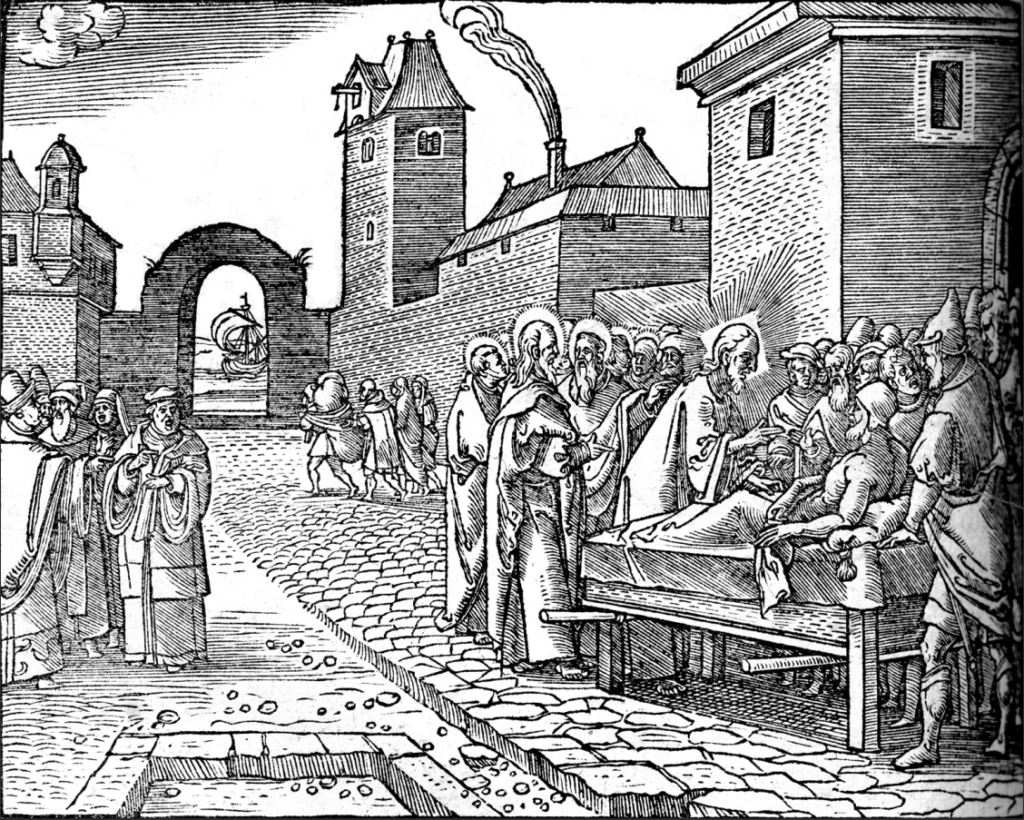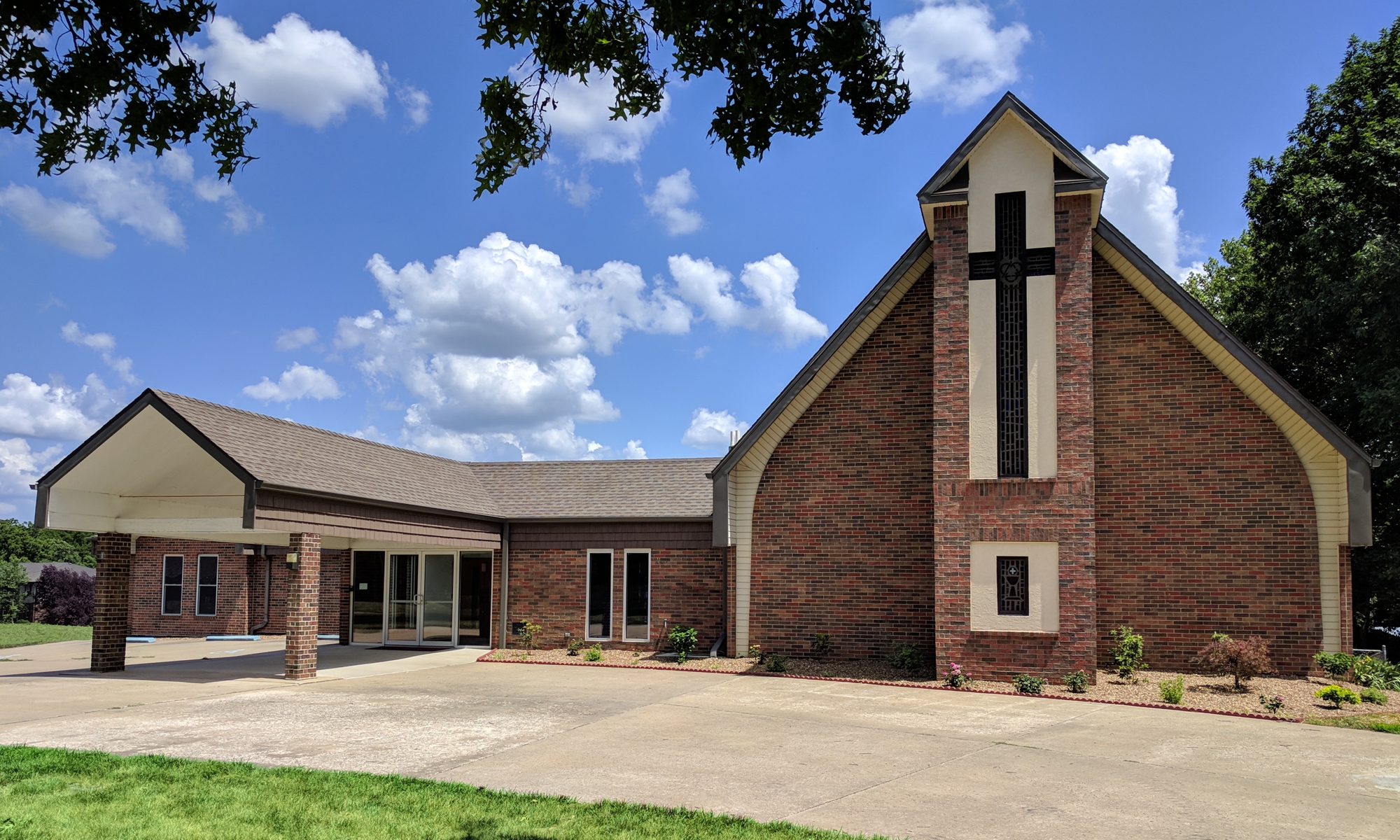
Lessons: Isaiah 44:21-23, Ephesians 4:22-28, Matthew 9:1-8
Hymns: LSB 916, 746, 522, 730, 814
Grace, mercy, and peace to you from God our Father and our Lord and Savior, Jesus Christ. Amen.
A paralytic is brought to Jesus by some people who cared for him. Unable to walk, the lame man depended on the mercy of others. He was brought to Jesus because they wanted Jesus to heal him. That way he can care for himself, live with independence, get a job, and be normal. Perhaps he also intended to give thanks to Jesus and praise Him—to bear witness of Jesus for healing him.
But instead of immediately healing the man, Jesus says and does something else first. He said, “Take heart, my son; your sins are forgiven you.” He does so because He saw their faith—that they are Christians who trust in their Savior. Jesus offers them the true blessing for His coming. He didn’t come to heal some people and thereby prove how amazing He is. Instead, He came to reconcile sinners to God by earning for sinners complete and full forgiveness. This forgiveness was not free or cheap, but Jesus obtained it through the shedding of His innocent Blood as He died on the cross in our place.
So, Jesus pronounces this blessing to the lame man. He then heals him, proving to His scoffers that He has authority on earth to forgive sins. The false belief that only God can forgive sins has continued to this day. Yes, forgiveness originates with God, for only Jesus died on behalf of sinners to earn this forgiveness. Yes, salvation is only granted through Jesus. But then when Jesus rose from the dead, He breathed on His disciples and said, “Receive the Holy Spirit. If you forgive anyone his sins, they are forgiven; if you do not forgive them, they are not forgiven” (John 20:22-23 NIV). Jesus gave this authority to men. It is administered by Christ’s ministers through His Church. Yet, many churches talk about forgiveness received by faith, but don’t actually pronounce forgiveness. Many protestants say our Lutheran practice of confessing our sin and receiving the Absolution is too Catholic. They take offense at a man declaring forgiveness to sinners. In their offense, they deny poor, troubled consciences the very consolation that Christ seeks to administer through His Church. Instead of declaring that forgiveness sorely needed, they tell sinners to search within for answers, or to take comfort in their obedience to Christ.
Denying sinners who are alarmed of their sin the comforting words of the Absolution is murderous to souls. Instead of consoling an accused conscience with the confident declaration, “Be of good cheer; your sins are forgiven you,” he is told they have no authority to say such things. They say he must believe, then he’ll have it. And then the accused soul will question if he believes enough—if he’s sincere enough—if God could ever forgive him.
But when the Absolution is declared in accordance to our Lord’s teaching, troubled consciences can hear with their own ears the voice of God through their pastor. They hear their sins are truly forgiven them. And they can be confident that “this is as valid and certain, even if Heaven, as if Christ our dear Lord dealt with us Himself.”
Now let’s return to our Gospel lesson and consider three ways this account could have gone, along with their potential reactions. First, how do you think they would react if Jesus just sent them home forgiven without healing the paralytic? Would they leave with great cheer, praising and thanking God for what they received? Would they say, “We are so blessed. We got to be in the presence of the Son of God today. He acknowledged us. And He forgave the paralytic?” Or would they be disappointed, asserting that Jesus should have given them what they were looking for? Would they grumble and complain since Jesus healed others but not the paralytic? Would they say, “We asked for the amazing gift of walking, but all our friend got was this lousy word that his sins are forgiven?” It reminds me of those t-shirts like, “My parents went to Hawaii and all I got was this lousy t-shirt.” Implied, of course, is that t-shirts are lousy. But would that t-shirt be lousy to the person whose house burned down last night and lost everything? Would that t-shirt be lousy to those who are in abject poverty due to war or famine and struggle to find clothing?
My first point is really this: we should be thankful for whatever blessings our Lord chooses to send, especially when we are forgiven. So often we want to compare the blessings we have received with the blessings others have received. Whether those blessings are great or small, amazing or simple, miraculous or common, we can give thanks. Even if the Lord sends affliction or hardship, we can still give thanks. For we still belong to Him. Remember, the Lord saw the lame man’s faith and forgave him. The paralytic was blessed beyond measure whether he could walk or not. For he belonged to God’s family, was forgiven, and, as a result, eternal salvation awaited him.
Second, what would have happened if Jesus sent the lame man home healed but not forgiven? Of course, that is what he was asking for. He would have gone home very happy. He probably thought he was very blessed for being healed and figured he received the best of what Jesus had to offer.
That is common today. Many do not seek God to obtain forgiveness. Perhaps they figure they don’t need it. Maybe they’re taking for granted what God generously offers. But many think the notion of forgiveness is insignificant compared to the many things people figure they need. Every now and then a stranger stops by or calls our church, looking for something. I’ve never had anyone ask if we offer the forgiveness of sins. Instead, the requests are usually for food, gas, lodging, or money. If I told them I have something better to offer, they will probably respond, saying, “But that won’t help me eat or get to my destination or provide shelter tonight.” We often look at our immediate needs and neglect our greatest need. That is, we often don’t see that our greatest need is the forgiveness of sins. We’re so busy being focused on what demands our immediate attention that we forget what we should really be focusing on.
So this gets me to my second point. Satisfying our temporal needs should never supersede satisfying our eternal needs. Just because we need something now doesn’t mean we should forget about the things that are truly needful to obtain eternal life. Jesus could back at any time. We must be ready. Yet, we often take forgiveness for granted, assuming everyone has it all the time. We forget that repentance and faith are required to obtain forgiveness. Jesus saw their faith. So he forgave the paralytic. He gave him the greatest gift. “For where there is forgiveness of sins, there is also life and salvation.” The gates of heaven were opened to the lame man. Should he have died at that very moment, he would have been received into Paradise. He was reconciled to God. His sin was replaced with the very righteousness of Christ. He was seen by His Father in Heaven as perfect. As high as the heavens are above the earth, this is how much Jesus loved the paralytic, and this man’s sin was removed from him (Ps. 103:11-12).
Such a blessing it is to be forgiven! There’s nothing greater. That’s why it is so important that we bring our little ones to the baptismal font, then to Church each Sunday as they grow, along with Sunday School and Catechism classes. That is also why we do far more teaching of the Christian faith at home through the family altar than what they receive a couple hours a week at church—by daily devotions and Bible readings, singing the faith, and learning the Catechism. In all of this, we are directing our children to their Savior, Jesus, who loves them and forgives them.
Third, what would have happened if Jesus gave the paralytic two choices and he could only have one? Healing or forgiveness? Which would he take? Of course, as we sit in church we would say, “Forgiveness.” But does that match what people often do? When we are offered a healthy snack, we say we’re not hungry. But when we are offered junk food, then we open wide our mouths and pile it in. We may give a nice gift to a child who then has more fun with the packaging or wrapping paper than the gift itself. We can also see what people do when they’re given the choice between forgiveness and other things through where they are on Sunday morning. If they choose sleep, entertainment, shopping, family, or a host of other things over going to Church, it suggests that they are choosing those things over the forgiveness of sins. Their priorities are being revealed. What is truly important to them is on full display.
And that gets me to my third point. There is nothing more important than the forgiveness of sins. While it is good to enjoy the First Article gifts that God loves to grant like sleep, entertainment, shopping, or family, none of these save us. Only Jesus does when He forgives us. The only way to Heaven is through Jesus for He alone died and rose for us. As I mentioned last week, we must be perfect to enter Heaven. This perfection is credited to us by our gracious Savior when He forgives us and replaces our sin with His very righteousness. Jesus does not do this when we simply think or feel the need to have these blessings. Instead, He imparts forgiveness through Baptism, the Absolution, His Word, and the Altar as He offers His Body and Blood. This is how the Holy Spirit works faith in us—faith which receives the forgiveness Jesus graciously gives us.
I want you to know, dear brothers and sisters in Christ, how blessed you are to be forgiven by Christ—to be received into His favor—to be reconciled to God—to realize that Heaven awaits you. For the Christian faith is all about Jesus who forgives us. This is what you truly need, and what you receive here. Amen.
The peace of God which passes all understanding keep your hearts and minds in Christ Jesus to life everlasting. Amen

